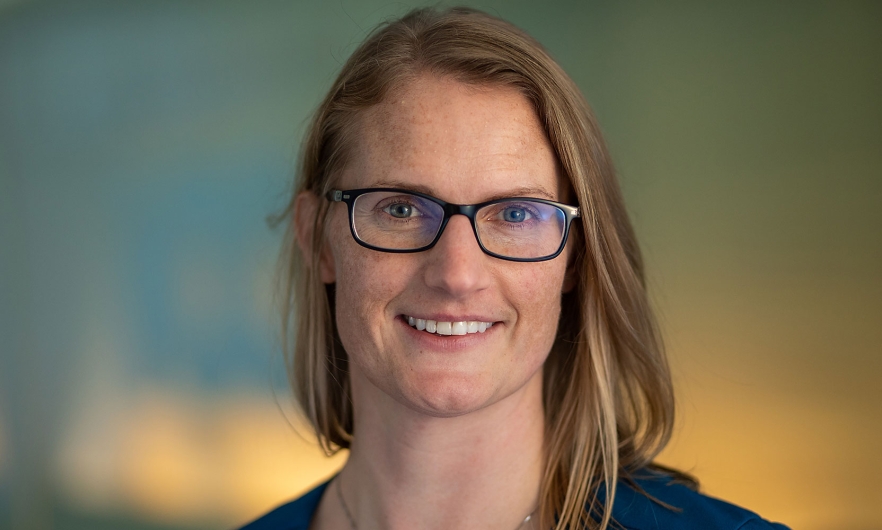Cassandra Crifasi Named New Co-Director of Johns Hopkins Center for Gun Violence Solutions at Critical Time in U.S. Gun Policymaking

The Johns Hopkins Center for Gun Violence Solutions at the Bloomberg School of Public Health has named Cassandra Crifasi as the new co-director of the Center for Gun Violence Solutions. Crifasi, currently deputy director of the Center, will serve as co-director with Joshua Horwitz, JD, the inaugural Dana Feitler Professor of the Practice in Gun Violence Prevention and Advocacy in the Department of Health, Policy and Management to jointly lead the Center at this critical time for shaping gun violence prevention policies in the U.S.
Crifasi, a well-known expert on firearm purchaser permits, safe firearm storage, and public opinion on gun ownership, will assume her new leadership role on January 1, 2023.
The Center for Gun Violence Solutions was formed earlier this year when the Educational Fund to Stop Gun Violence, an advocacy nonprofit Horwitz led for 30 years, merged with the Bloomberg School’s Johns Hopkins Center for Gun Violence Prevention and Policy. The Center brings a public health lens to reducing gun violence in the U.S. by focusing on research while also expanding evidence-based advocacy efforts at the local, state, and federal levels for effective and equitable policies. This leadership change comes at a critical time for successfully shaping gun policies in America, as witnessed by the state of Oregon’s passage of a new purchaser licensing law in last week’s elections.
Crifasi succeeds Daniel Webster, ScD, MPH, Bloomberg Professor of American Health and current co-director of the Center for Gun Violence Solutions. Before co-directing the Center for Gun Violence Solutions, Webster led the former Center for Gun Violence Prevention and Policy since 2001. He is a nationally recognized expert in firearm policy and gun violence prevention, including community gun violence, intimate partner violence, youth violence, and policies on the public carrying of firearms. Webster will remain core faculty of the Center and assume the title of Distinguished Research Scholar.
“Cass has played a critical part in the Center’s efforts to advance gun violence solutions, and we are thrilled for her to bring her expertise to the co-director role,” says Ellen MacKenzie, PhD, ScD, dean of the Johns Hopkins Bloomberg School of Public Health. “Her understanding of effective policies and public opinion research makes her the ideal choice to lead the Center with Josh Horwitz. Under their leadership, and with Daniel’s continued contributions, the Center will build on momentum shaping common sense gun policies and preventing tragedies.”
Crifasi and Webster will co-lead new research funded by a $5 million, five-year grant from the Robert Wood Johnson Foundation. Several of the research projects will focus on policy solutions to inequities across the criminal legal system and disparities in gun violence between white Americans and minoritized groups. The grant will also provide support for a more diverse roster of researchers and address the need to elevate the voices of impacted communities.
“I am excited about my new role as co-director of the Center,” says Crifasi. “A core pillar of public health is effectively advocating for changes we know will improve health and save lives. I look forward to working closely with Josh to turn evidence on effective gun violence prevention into action."
Crifasi has extensive experience in the field of gun violence and injury prevention. Her research focuses broadly on public safety including injury epidemiology and prevention, gun violence and policy, attitudes and behaviors of gun owners, and underground gun markets. Crifasi earned her PhD from the Bloomberg School in 2014, and an MPH from Drexel University School of Public Health in 2010.
In practice, Crifasi has worked closely with the city of Baltimore on developing and implementing a variety of strategies to reduce violence. She served as the deputy director of the Johns Hopkins-Baltimore Collaborative for Violence Reduction, a research unit for the Baltimore Police Department, helping collect and evaluate data on a wide variety of topics, from officer recruitment strategies to officer training. She also co-authored a report, Reducing Violence and Building Trust: Data to Guide Enforcement of Gun Laws in Baltimore, which found a more focused policing approach could reduce violence and improve community relationships with city police.
Horwitz has been a leading gun violence prevention advocate and expert for over 30 years. He helped develop and advance Extreme Risk Protection Order (ERPO) laws that allow courts to temporarily remove firearms when there are warning signs of someone being at risk of harming themselves or others. To date, ERPO laws have been adopted in 19 states and Washington, D.C. Research shows they are a promising strategy to reduce both suicides and mass shootings.
Recently, the Center supported and endorsed a groundbreaking purchaser licensing ballot initiative in Oregon that was passed in last week's midterm elections. The new Oregon law requires a prospective firearm purchaser to obtain a permit from law enforcement prior to purchasing firearms, and that purchasers complete safety training and pass a criminal background check. It also bans the sale of high-capacity magazines with 10 rounds of ammunition or more. The measure was motivated by research led by Center faculty that shows that handgun purchaser licensing laws reduce homicides, suicides, mass shootings, and shootings involving law enforcement officers, and that large-capacity magazine bans reduce fatal mass shooting.
The Center is also examining the intersection of white supremacy and guns, political violence, and the Second Amendment. Earlier this month, the Center hosted a virtual event featuring legal and political science experts, including U.S. Representative Jamie Raskin (D-MD), and was moderated by Keshia Pollack Porter, PhD, Bloomberg Centennial Professor and chair of the Department of Health Policy and Management.
“I am excited about the future of the Center under Cass’ and Josh’s leadership, especially the work the Center is doing to examine the role of white supremacy, racism, and gun violence,” says Pollack Porter. “With their combined experience and expertise, Josh and Cass will continue to lead efforts that turn research into action and advance goals around inclusion, diversity, antiracism, and equity.”
# # #





